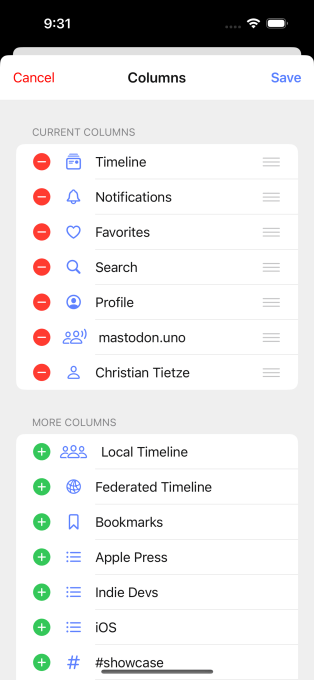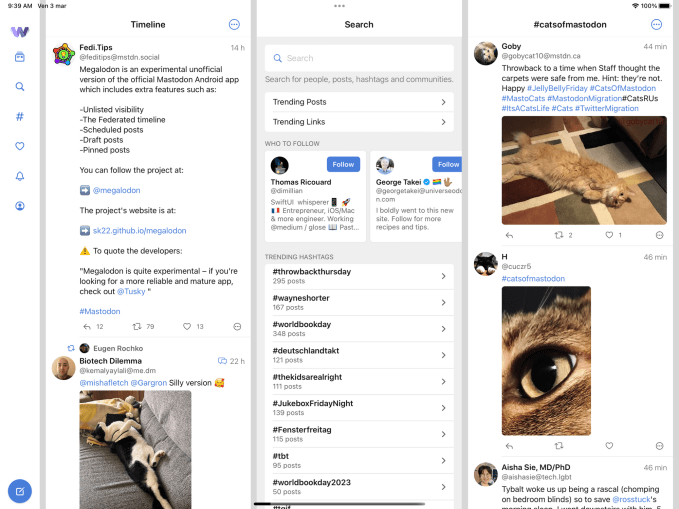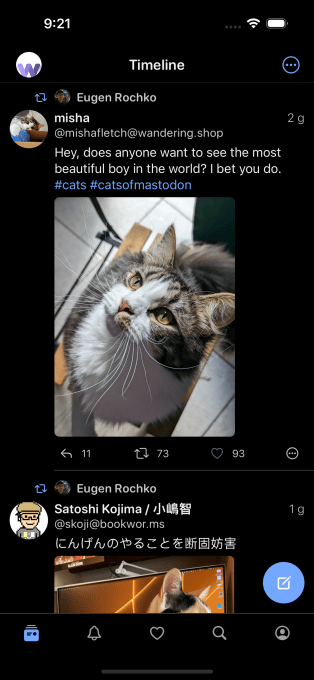Woolly introduces a Twitter and TweetDeck-inspired Mastodon app
The slow but steady Twitter exodus has brought a new abundance of third-party Mastodon apps like Ivory, Mammoth, and Ice Cubes that connect users to the increasingly popular open source and decentralized social network. Today, we can add one more app to that list with the launch of Woolly, another solidly built iOS Mastodon client focused on offering a more customizable home screen, threaded views for reading longer conversations, and a TweetDeck-inspired layout for the iPad.
According to Woolly’s creator, Matteo Villa, the main differentiator between his app and others is the approach he took to home screen customization. With Woolly, users can pin things like multiple remote timelines, lists, bookmarks, search, hashtags, or even other user profiles directly to the app’s main tab bar, enabling quick and easy access to your favorite content.
You can also customize the icon associated with each pinned section for a more personalized experience.

Image Credits: Woolly
On both iPhone and iPad, the different pinned “columns” can be accessed by tapping on their icon, but on iPad, the columns are also presented in a TweetDeck-like view.
This latter option may appeal to those who were more heavily dependent on Twitter’s often-ignored social media dashboard app, which the company has seemingly been winding down by dropping the TweetDeck Mac app last summer after discontinuing its mobile client and Windows support in prior years. (And of course, it’s unclear to what extent TweetDeck even has a future under Elon Musk’s ownership.)

Image Credits: Woolly
Another standout feature in Woolly’s new app is its support for threaded conversations, which resembles Twitter’s own look and feel, complete with connective lines between posts to help you follow the replies as you scroll down. The feature aims to offer “a better reading experience for longer conversations,” Villa explains, which was something he particularly missed when he switched to Mastodon’s official app.
The similarity between Woolly and Twitter doesn’t stop there, either. Even the line of icons for engaging with Mastodon posts feels a bit familiar, as the row starts with the reply button on the far left, followed by the retweet (or “boost” in Mastodon lingo), then the heart icon for favoriting a post, as on Twitter.

Image Credits: Woolly
There are several other nice touches in Woolly, too, like a way to filter your timeline to hide boosts and replies, settings that let you specify if you want to open links in-app or in the system browser, a selection of both light and dark mode themes to choose from, toggles for hiding or unhiding sensitive media or hiding posts with content warnings, plus access to trending posts, links, and hashtags.
At launch, Woolly is still not as feature-rich as some other apps, like Ivory which includes access to things like analytics and more custom timeline filters. However, Woollly comes across as a polished and stable app that also has the potential to make former Twitter users feel more comfortable when making the switch to Mastodon.
Since Musk’s takeover of Twitter, the federated social web has been gaining ground, as some former Twitter users began to experiment with other places to socialize online.
Mastodon’s user base has grown too, as a result, reaching 2.5 million monthly actives by year-end. Though some Twitter users have since departed, the network still has 1.2 million monthly active users and the wider Fediverse of decentralized social apps has grown to 2.3 million monthly actives. Recently, Mastodon has seen an uptick as services like Flipboard and Medium began setting up their own servers for their own customers to use. Plus, WordPress.com’s owner just bought a plugin that allows blogs to reach readers on federated platforms. Over time, these moves could potentially grow the number of active users on the Fediverse.
Available today on the App Store, Woolly is available as a free download so you can take a look and test it out. But if you want to actually use the app to post to Mastodon you’ll have to purchase its in-app subscription. Currently, this costs either $0.99 per month or $6.99 per year and offers the ability to log in to multiple accounts, customize the main tab bar, unlock more themes, and, soon, utilize Home Screen widgets, too.

